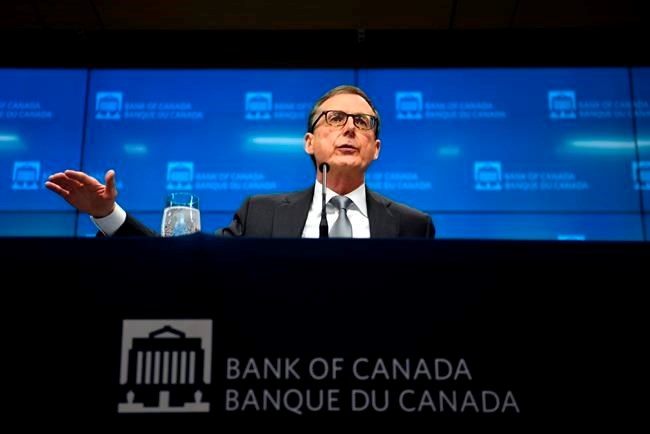OTTAWA — The country's top central banker is warning of uncertainty for how quickly three-decade-high inflation rates will come back down to the Bank of Canada's comfort zone.
Governor Tiff Macklem told the Senate's banking committee on Wednesday that the cloudy outlook is due to the unique circumstances surrounding the pandemic and the global reopening of local economies.
Supply-chain issues that has driven up shipping costs and consumer prices could last longer, Macklem said, as he noted that they have been more persistent and pervasive than the bank first expected.
The result has been that the annual pace of inflation climbed in December to 4.8 per cent, a pace that hadn't been seen since September 1991.
Macklem told senators that the annual inflation rate could stay "uncomfortably high" around five per cent over the first half of 2022, noting the impact that will have on lower-income Canadians as prices rise for gas and food.
The uncertainty in the outlook prompted senators to ask Macklem to defend the bank's recent forecast that inflation rates would drop close to the Bank of Canada's comfort zone by the end of 2022, given how off the mark previous forecasts for inflation turned out to be.
Macklem said inflation could fall faster than expected if price pressures ease quickly for goods, or even go in reverse. On the other hand, he said, supply chain issues could, like the pandemic, be longer lasting.
"The virus is still out there. It's possible that Omicron affects production facilities in other parts of the world. So there is certainly still some uncertainty," Macklem told senators.
"What I do want to underline, though, is that we will be, and we are, working to manage that uncertainty."
He pointed to the bank's clear signal that interest rates will have to rise to bring inflation back to the bank's two per cent target.
The Bank of Canada held its key policy rate unchanged late last month at 0.25 per cent, which is where the rate has been since the onset of the pandemic in March 2020, but dropped its promise to keep rates at rock-bottom levels.
Statistics Canada reported Tuesday that real gross domestic product in November rose just above the levels seen pre-pandemic in February 2020. Macklem said the reading reinforced the bank's view that the economy was back at its productive capacity.
He also noted that employment is above pre-pandemic levels, businesses are having a hard time filling job openings and wage increases are picking up.
Coupled with high inflation, economists believe the Bank of Canada will raise its trendsetting interest rate in March, although Macklem didn't say when hikes would start, how much the bank would raise the rate, or how many increases could come over the course of the year.
"It's clear that interest rates need to be on a rising path," Macklem said. "The slope of that path is going to depend on economic developments, and if consumers spend more, the slope of that path, likely, has to be steeper."
An increase in the central bank's key rate would influence the rates charged on things like mortgages. Macklem also said the central bank plans to reduce its holding of federal bonds once rates rise, which would also push up interest rates.
This report by The Canadian Press was first published Feb. 2, 2022.
Jordan Press, The Canadian Press




